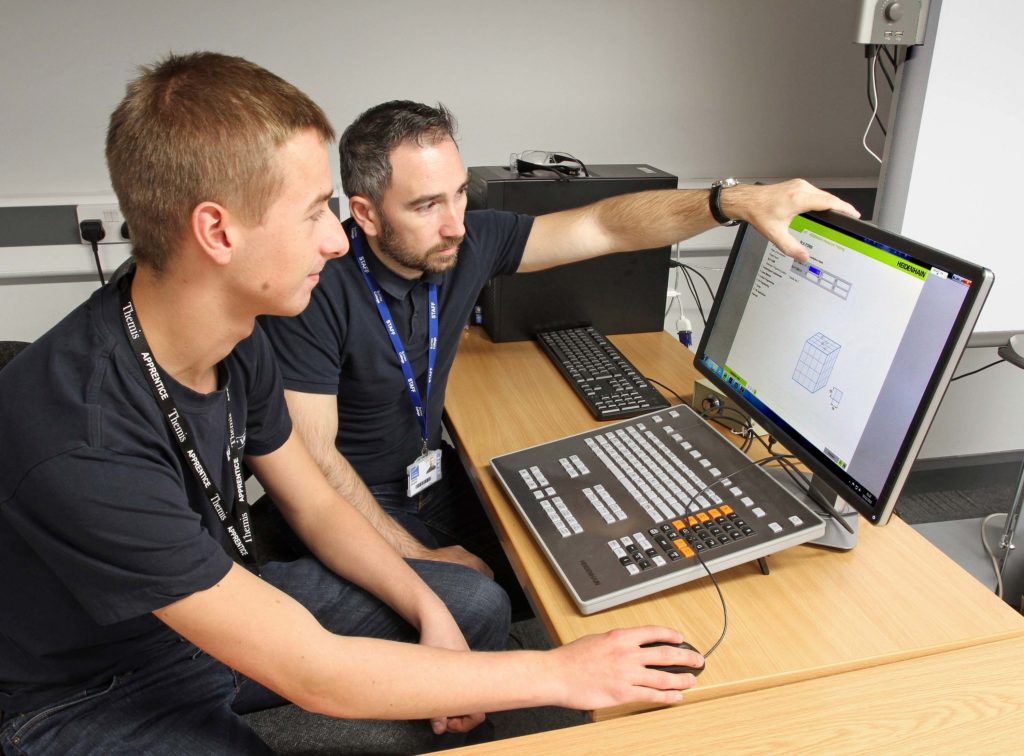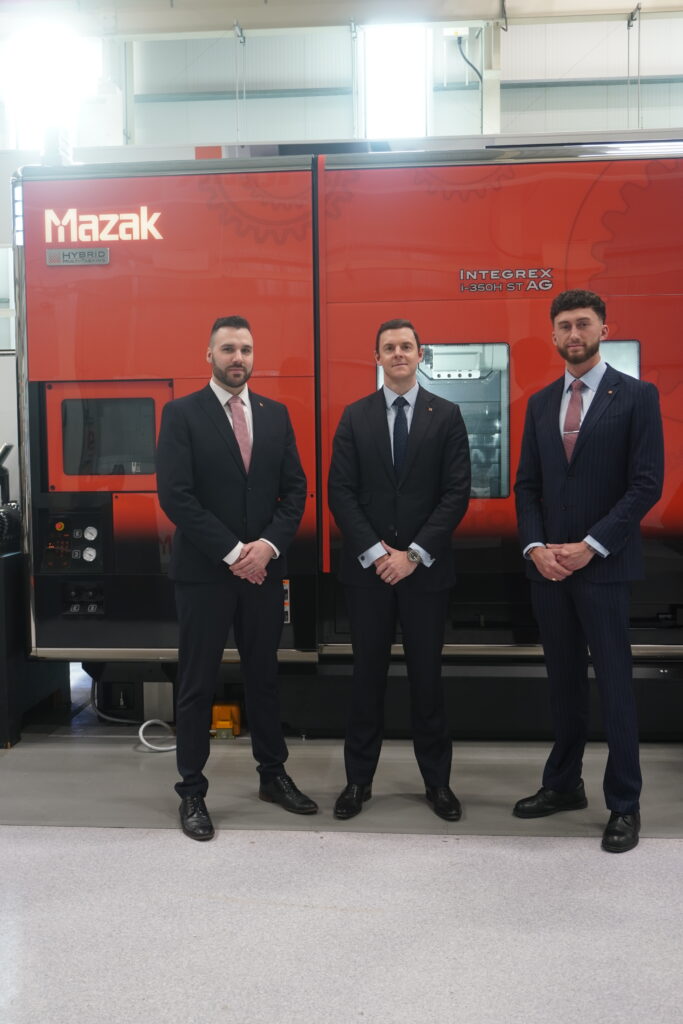HEIDENHAIN INTERACTIVE TRAINING BRINGS THE SHOP FLOOR TO THE CLASSROOM
Estimated reading time 6 minutes
Engineering apprentice numbers at one college in the north
of England surge from 12 to more than 400 in six years
Training students to become CNC machinists has never been easier, according to Kris Richens, programme leader for engineering apprenticeships at Burnley College and one of its senior lecturers. His comment follows the acquisition last year (2015) of a Heidenhain Interactive Training (HIT) system comprising workbooks, server software and a network of 20 workstations for students. The material covers DIN/ISO programming, while a separate module teaches Heidenhain’s widely used conversational data input.
Mr Richens said, “When we train apprentices, BTec students and people studying for HNC Level 4 to program the proprietary Mazatrol CNC system fitted to Mazak machine tools, we can only have two people standing at each of three vertical machining centres in our workshop.
“Things are even more restricted when teaching how to program turn-milling cycles on our Colchester lathe with Fanuc control, as only two students can be around the machine at a time.
“The HIT system is much more flexible and as far as I know unique. Realistic training is carried out in a classroom environment with students sitting at a computer screen.
“In front of them is a programming station that is a PC-based replica of the company’s iTNC 530 control panel, one of which is fitted to a 3-axis Ajax training mill in our workshop. The only differences are that the classroom pad has a keyboard built in and there is no resident software, as that is provided from the server.
“Programs created by the students at their desks are downloaded directly to the mill so that the parts can be machined. It is seamless from lecture room to finished part, using a combination of theory and practice and a mixture of multimedia and traditional learning.”
He went on to explain that this approach is not possible with other makes of CNC, proprietary or generic. Either each training station is an actual control system complete with computer hardware and software, and therefore expensive; or it is based on off-line programming software, so the instruction bears little relationship to the hands-on experience of students when they are put in front of a machine tool.
Arrival of the HIT training material at Burnley College has come at a good time, as there is unprecedented need for teaching CNC skills. The number of locally-employed people studying four-year apprenticeship courses comprising NVQ Levels 2 and 3 plus BTec Level 3 (Technical Certificate), equivalent to the former time-served apprenticeship, has risen dramatically from 12 to more than 400 since 2009. Those studying aeronautical engineering, mechanical manufacturing engineering and toolmaking all need to be trained in CNC programming.
Others at the college also need to acquire CNC programming skills, such as the 40 students currently taking HNC Level 4 and the 200 post-GCSE school leavers studying BTec Level 3. HIT is especially useful for teaching this content, as the training material covers a lot of the criteria. It is far better than the old simulation software Burnley College previously used and allows the training to go much more in depth.
Mr Richens, himself a time-served apprentice toolmaker, continued, “With student numbers so high, we have a big requirement for a multi-platform, practice-orientated system for teaching how to program CNC systems.
“The HIT server software, which can be displayed on a whiteboard during lectures and linked to the students’ programming stations, is the ideal solution for teaching.
“The beauty of it is that CNC principles per se can be taught very effectively. With the hard part out of the way, it is then relatively easy to cross-train people to use another make of control, as the principles are similar and readily transferable.
“In my role as assessor on an academic board comprising representatives from 15 or so local engineering companies, when I discussed the possibility of adding Heidenhain CNC training to the college courses there was overwhelming support.
“The control is used widely in factories on machine tools from all over the world, so it makes sense to have targeted training for these particular CNC systems, as students are bound to encounter them in industry.”
Machine operators already working on the shop floor in local firms may need a refresher course in the capabilities of the German-manufactured control, or perhaps cross-training from using a different CNC system. Burnley College therefore intends to introduce commercial Heidenhain training courses alongside those it runs for Mazatrol and Fanuc. It promises to be a useful source of extra income for the college, which reinvests heavily in its educational services and recently spent £600,000 on infrastructure and new equipment.
In Mr Richens’ view, another advantage of HIT is the quality of the hard copy materials that support the software. The printed workbook, which is available as a free PDF document, includes step-by-step assignments to be completed and numerous programming examples. Users can jump between topics and study at their own speed, so the learning environment is ideal for people with different levels of knowledge.
Mr Richens added, “We have been impressed by Heidenhain’s after-sales support since we bought the interactive training software modules and desktop control pads. It has been outstanding and certainly the best of any supplier of equipment to the college so far.
“They helped us set up the system on our server and have given us more training than we were entitled to.
“HIT is also surprisingly inexpensive. I think Heidenhain regard it as a loss-leader, in the hope that we are training the next managing director of a manufacturing company – which we probably are.”
In conclusion, he drew attention to the big turnaround in UK manufacturing that Burnley College’s expansion underlines. He pointed out that there has been massive growth in engineering in East Lancashire since the last recession, which he believes is due in part to a substantial amount of re-shoring of manufacturing, particularly from the Far East.
It is driving a requirement for higher skill levels in production engineering. Coupled with an ageing industrial workforce and a generation of underinvestment in on-the-job apprentice training, the need for young people to acquire technical skills and qualifications has never been greater.
HEIDENHAIN (GB) Limited,
200 London Road, Burgess Hill, West Sussex, RH15 9RD.
Tel: +44 (0)1444 247711. Fax: +44 (0)1444 870024.
Email: sales@heidenhaingb.com
Web: www.heidenhaingb.com
Contacts: Neil Prescott, Managing Director.
Philip Lodge, Sales Manager



